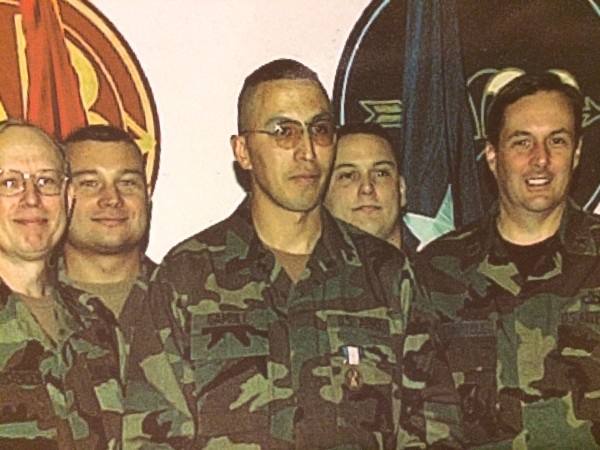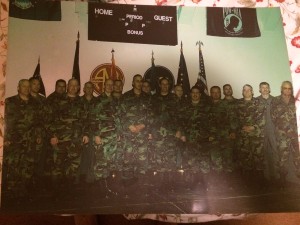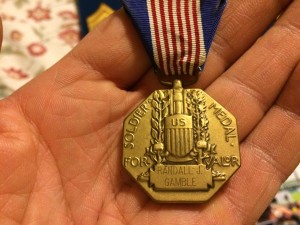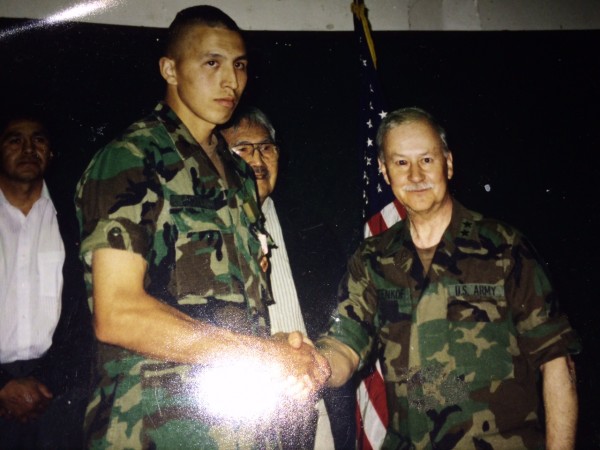Two weeks ago, Alaska Public Media aired a story about Army Staff Sergeant Joshua Schneiderman receiving the Soldier’s Medal, one of the highest military distinctions, and reported that it was the first time the medal was given for an act that took place in Alaska. That claim is incorrect.
Officials with the Army in Alaska were fairly confident that a Soldier’s Medal hadn’t been issued to a member of the Army in Alaska — but cautioned they were relying on institutional memory. Representatives from two different branches said that to their knowledge, however, there is no master-list of Soldier’s Medal recipients from the last 90 years.

After our original story aired, I received an email saying the medal had definitely been awarded to someone in Alaska before — a National Guardsmen, for a rescue that happened two decades ago in the Southeast community of Angoon.
Randall Gamble of Angoon was in his 20s back in 1995. He was serving in the Army National Guard. During a basketball tournament, the lights went out.
“They were out for a while,” Gamble said by phone. “I got nosy and wanted to see what was going on.”

There was an equipment problem. Gamble was helping a man from the power plant fix it. But soon after, a friend of his, Johnny Hunter, went 30 feet up a ladder, attached his harness belt, then made a huge mistake: He touched the wire while it was still live.
“And 7000 volts had gone through Mr. Hunter’s body, and he screamed. He went unconscious.”
Gamble was down below. He told some other men to call the fire department, and leapt into action.
“I looked up and said ‘Holy shoot.’ And as I did that I went up after Mr. Hunter and secured Mr. Hunter and had shaken Mr. Hunter rigorously to see if he was all right.”
According to the military citation, Gamble performed CPR and kept Hunter away from the charged lines for 45 minutes until rescuers could get to them.
He was put up for the Soldier’s Medal — an extremely rare award that is given when a member of the military risks his or her life to save someone else in a noncombat setting. It took eight years from the rescue until the award was officially issued. By then, Colonel Joel Gilbert was overseeing the unit as it prepared the award ceremony.

“I went over to Angoon probably about a month prior to start coordinating with village elders and start making sure that we could accommodate a nice award ceremony for Sergeant Gamble,” Gilbert said by phone from Joint-Base Elmendorf-Richardson.
He says the whole reason for the pomp and circumstance is recognition.
“No matter how many years it takes we should take care of our soldiers and follow through and do the very best we can for them. And for something like that, I especially believe we should recognize a soldier in their home community because as a national guardsmen you’re a citizen soldier — that, to me, is what it’s all about.”
Gilbert says the eight-year delay was an unfortunate byproduct of bureaucracy and the analogue technologies of the time.
For Gamble the incident was never about military distinction, it was about helping a friend in an emergency. He says the recognition was nice, but sadly by the time it came through in 2003 the man he’d saved wasn’t able to be there: He’d passed away from cancer.

Gamble was honorably discharged from the Guard in 2004, and still lives in Angoon.
Zachariah Hughes reports on city & state politics, arts & culture, drugs, and military affairs in Anchorage and South Central Alaska.
@ZachHughesAK About Zachariah




